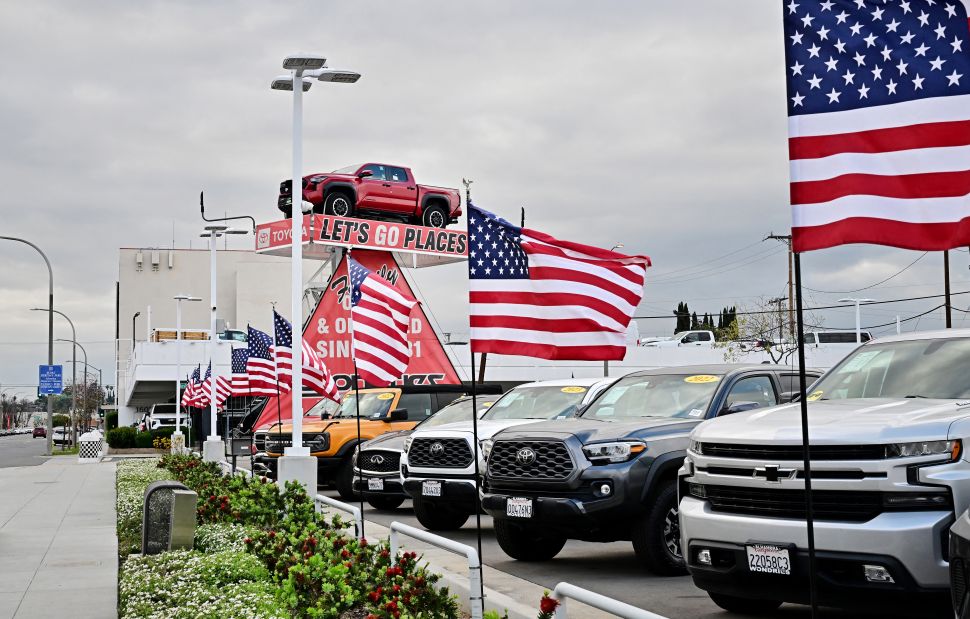The Trump administration claims that its incoming 25 percent tariffs on foreign cars and auto parts will boost business for vehicles made entirely in the U.S. But such all-American cars don’t exist—and they probably never will, according to industry experts.
Given that U.S. carmakers today source many of a vehicle’s roughly 30,000 parts from abroad, the prospect of shifting to a completely domestic supply chain is highly unlikely. “It won’t happen,” Stephanie Brinley, a principal automotive analyst at S&P Global Mobility, told Observer. “I don’t envision a space where 100 percent of the parts for any vehicle are produced in the United States.”
Nevertheless, American cars remain at the heart of President Donald Trump’s reasoning for imposing tariffs, which are scheduled to kick in for imported cars on April 3 and components on May 3. The President recently told NBC that he “couldn’t care less” if automakers raise foreign car prices as a result. “I hope they raise their prices, because if they do, people are gonna buy American-made cars. We have plenty,” he said.
The largest carmakers like General Motors (GM) and Toyota produce nearly half of their vehicles sold in the U.S. in foreign countries. Smaller companies like Elon Musk’s Tesla manufacture U.S. cars domestically. But even Tesla (TSLA), whose Model Y is ranked as the “most American” car of 2024 on cars.com, still relies on imported parts and components. Only 70 percent of a Model Y is made up of American or Canadian car parts, according to the National Highway Traffic Safety Association, with the rest primarily coming from Mexico.
On average, automakers with domestic manufacturing import 40 percent to 50 percent of parts from foreign countries, said Dan Ives of Wedbush Securities in an analyst note. “The concept of a U.S. car maker with parts all from the U.S. is a fictional tale that does not exist,” he added. Moving just 10 percent of the auto supply chain to the U.S. could take up to three years and cost the industry hundreds of billions of dollars, according to the analyst.
Electric vehicle makers import batteries from China
Electric vehicles have fewer components than internal combustion engine (ICE) cars, but they still rely on countries like China for lithium and lithium-ion batteries. Localizing production would be no easy task. “It can take a decade to get a lithium mine up and running,” said Brinley, who noted that in some cases, it might be easier to take the hit of a tariff on a component than shift sourcing.
The impacts of tariffed components, meanwhile, will be felt throughout the entire industry. For car owners, repair costs will likely rise, said Jessica Caldwell, head of insights at Edmunds, in a statement. Higher reconditioning prices will hurt dealers, while increased fees associated with vehicle accidents will likely raise insurance premiums, she added.
For now, car components coming from Canada and Mexico that comply with the U.S.-Mexico-Canada (USMC) trade agreement will be exempt from levies until U.S. Customs and Border Protections establishes a system to apply tariffs to non-U.S. parts, according to the Trump administration.
The interdependency of the industry’s supply chain is especially evident in North America, where some components cross each country’s borders numerous times during a car’s assembly process. A seemingly simple part like a car seat, for example, could go back and forth across the nations for components like seat frames, seat foam and headrests before they are even put into a vehicle.
The complicated nature of auto parts manufacturing means it’s difficult to precisely measure the impact of tariffs. “It’s going to be very difficult for a consumer to to able to have visibility into why their vehicle is more expensive,” said Brinley.
A rough estimate is that consumers will soon see price increases between $5,000 and $10,000 on an average car, said Wedbush’s Ives. Depending on the inventory of an automaker, hiked prices will likely begin trickling in 50 to 60 days after tariffs take effect, noted Brinley.

